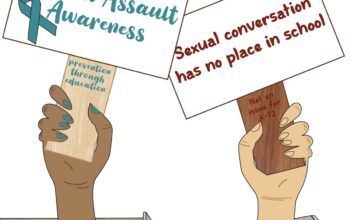Cat Levine, Executive Editor
@catcourant
Senioritis– A crippling disease that strikes high school seniors. Symptoms include: laziness, an over-excessive wearing of track pants, old athletic shirts, sweatpants, athletic shorts, and sweatshirts. Also features a lack of studying, repeated absences, and a generally dismissive attitude. The only known cure is a phenomenon known as Graduation.
For the past four years, I’ve dreamt of the day that I could call myself a Second Semester Senior. I’ve spent more than enough time memorizing random equations and grammar rules so that I could spend four hours taking the SAT and ACT. I’ve trekked through endless amounts of college information sessions and campus tours cross country. I’ve stared at supplemental essays, finding ways to make them fit the word count for college applications. Common App, Naviance, and College Confidential are my most frequently visited sites. The teen center booth at the library became a second home during midterm week and Ubereats was on speed dial. I’ve salimated over the refreshing feel of leaving behind the stress, screams, and tears of first semester and moving onto a new beginning- the third quarter.
Now for the past week, teachers have been making an effort to take down the Second Semester Senior stigma that has plagued schools nationwide since the beginning of time. I’ve had the “just because you’re in college doesn’t mean you shouldn’t care” and the “although it might seem tempting, you can’t let yourself fail out of your classes.” Of course we listen and understand the importance of these efforts, however often we find ourselves ignoring the warnings of their teachers. AP classes in particular still have to follow and finish a rigorous course curriculum in time for the dreaded May testing. However, this doesn’t stop seniors from instagramming the #SSS post. One has to think: is it the students or the system?
With the increasingly popular tendency of students to apply Early Decision and Early Action, seniors can find out as early as December where they will be attending college in the fall. This confirmation of their future leaves many in a place of limbo. We feel as if what we do in high school no longer matters towards our immediate goal, getting into college, but we have months to go until we can move onto the next step. Why study for my math test if I’m studying political science in college? Why write my english paper if I’m never going to take another class like it again? Yet what many don’t take into consideration is that colleges take notice of this. Often, acceptance letters are accompanied by an ending line or follow up email saying “Your admission is contingent on continued successful performance,” which is the last official step to get into college.
Google senioritis and you’ll find that every article is predictable- what teachers can do, what administrators can do, what parents can do, and what seniors can do. According to Karielle Gam of the Huffington Post, you should consider your parents as “the biggest role they will play in college is funding your future. They’ll shell out tens, possibly hundreds, of thousands of dollars for your education, so show them gratitude and work at helping minimize those costs,” she said. “Many merit-based and private scholarships have a grade cutoff just for consideration. Make yourself stand out as the best possible candidate for financial aid by keeping your grades up.” We aren’t always considering our parents in the quality of our work when we’re turning in an assignment. That’s normal. We’re working ourselves tireless to get into a college that our parents will approve of, and now they’re playing the guilt card on how much money they’ll spend on us? Seems repetitive.
Tamar Lewin, author of A Warning: Colleges can Change their Minds, advises students that colleges take notice to second semester transcripts. “Somewhere in all those college admission letters, after the “congratulations’’ part, is a sentence to the effect that admission is conditional upon the student completing high school with the same academic and personal achievement on which the offer was based. And they mean it. Each year, colleges rescind offers to students whose grades plummeted after they were admitted. Generally, one stray C won’t have serious repercussions, but make it a couple of D’s on a transcript that had been crammed with A’s and B’s and there may be trouble.” However, teachers threatening is the opposite of what seniors need. This creates an us-versus-them-mentality where a certain class is now an obstacle that you need to pass in order to move on to college. Combating senioritis means finding the motivation that lethargic seniors often lack, not forcing them to try out of fear of rescission.
The fact is that as long as senioritis has existed, no one has done anything substantial to cure it. If senioritis is an intangible mental affliction, what can we do? What impact will a scolding have if we ourselves are not motivated? It’s a systemic problem, yet we aren’t even addressing the potential to adapt the K12 curriculum.
Now the question to ask is what can administrators do to prevent senioritis? Nothing. The way that K12 education is setup, it’s not feasible. You have to operate within existing boundaries and that’s the issue. Certainly the internship is a way to deal with senioritis, however it has to wait until the completion of AP exams. We are all but slaves to College Board. Nothing interesting can start until after these exams. We have to consider the large percentage of students that aren’t taking any AP courses, or don’t plan on taking the exams, yet are still left waiting. A possible solution for College Board to consider is moving AP exams to January to leave room for an extended internship and an end to senioritis before it starts.
Senioritis is often inevitable in high school seniors. We all get it at some point. At times, it feels impossible to open your backpack and pull out a notebook. There are days when laying in bed and watching an almost unnecessary amount of netflix sounds more appealing. However, it is important to recognize it. You aren’t to blame if you are affected, but you are at fault if you are aware of it and don’t do anything to reverse the negative consequences it may have. It’s second semester. College applications are submitted, test scores have been reported, and transcripts have been sent. We’ve made it. We only have a few more months until the next part of our life, the college chapter, begins, but for the time being we’re here and there’s still work to be done.




